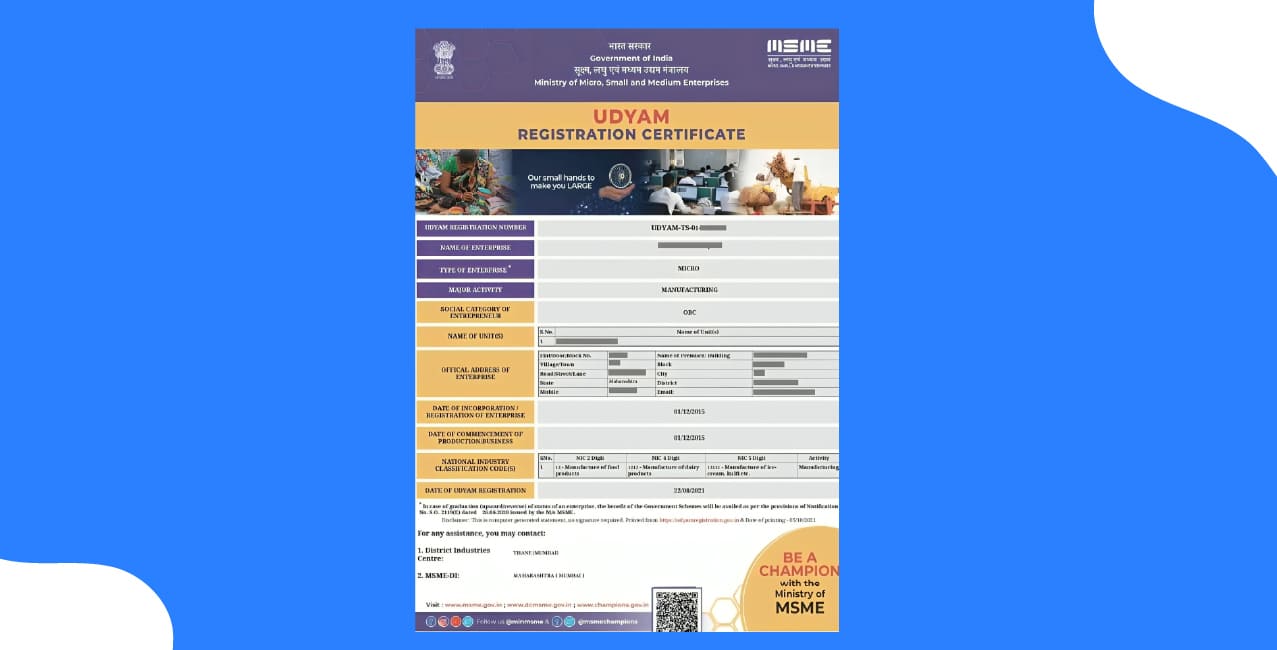What is the MSME Certificate: Eligibility, Benefits & How to Apply

Check Your Loan Eligibility Now
By continuing, you agree to LoansJagat's Credit Report Terms of Use, Terms and Conditions, Privacy Policy, and authorize contact via Call, SMS, Email, or WhatsApp
Key takeaways
MSME Certification (Udyam Registration) is optional; however, it provides access to loans, subsidies, and tender possibilities.
Classification is based on both investment and turnover; the lower parameter determines eligibility.
The Udyam portal accepts free, online, and paperless registrations.
The certificate is good for a lifetime, but it must be updated if the thresholds change.
An MSME Certificate (Udyam Registration) is an official certification from the Government of India that classifies enterprises as Micro, Small, or Medium Enterprises. This registration, which was implemented in 2020, allows firms to obtain financing, subsidies, tenders, and tax breaks through an easy digital process.
Neetya, a bakery entrepreneur in Mumbai, invests ₹8,00,000 in equipment and generates an annual turnover of ₹45,00,000. With Udyam Registration, she is officially recognised as a Micro Enterprise, gaining access to lower loans, government initiatives, and subsidies that were before out of reach.
What is an MSME Certificate?
An MSME certificate is an official recognition issued by the Indian government to businesses classified as Micro, Small, or Medium Enterprises. It is also called Udyam Registration, introduced in 2020 for a simplified and paperless process.
For Example, Neetya applies online for Udyam Registration using her Aadhaar number. Within minutes, she receives a digital MSME certificate with a unique Udyam Registration Number (URN). This certificate validates her business as a Small Enterprise.
An MSME certificate is not mandatory. But it unlocks many benefits such as cheap loans, subsidies, tax concessions, and government assistance. Without it, Neetya would miss out on these advantages, even though she has been operating her bakery for five years.
Eligibility Criteria for MSME Registration
To qualify as an MSME, businesses must meet specific investment and turnover limits depending on the category. Before you apply, your business must meet both investment and turnover thresholds. The table below shows how enterprises are classified:
Classification provides equitable benefits: a bakery like Neetya's (₹8,00,000 investment, ₹45,00,000 sales) qualifies as Micro, while a business with ₹15 crore investment and ₹90 crore turnover falls into Medium. Both can get advantages, but at different levels.
For Example, Neetya’s bakery invested ₹8 00,000 in equipment and makes a ₹45 00,000 turnover annually. She falls under the Micro category. A second bakery with ₹8 crore investment and ₹40 crore turnover qualifies as a Small Enterprise. A third example: ₹15 crore investment and ₹90 crore turnover qualify as a Medium Enterprise.
Note- MSME eligibility is always decided by the lesser of two parameters: investment or turnover. Additionally, turnover data are checked by GST reports, assuring correctness and flexibility in classification.
Documents Required for MSME Registration
The process is completely online and paperless. But clear digital copies are needed for accurate data.
List of Key Details Needed:
- Proprietor’s Aadhaar number
- PAN of the owner and the business
- Bank account number and IFSC
- GSTIN (if registered)
- Details of business activity: type, address, date of commencement
- Investment details: machinery and equipment costs
- Last two years' turnover data
Ex- Neetya has:
- Aadhaar: 1234‑XXXX‑XXXX
- PAN: PRIPK1234M
- Bank account with SBI Chennai
- GSTIN from bakery supplies
She entered the bakery start date as 01‑Jul‑2019 and investment as ₹8,00,000. That’s all she needs.
Benefits of MSME Registration
Once registered, an MSME can avail multiple benefits that boost operations, reduce costs, and ensure stability.
Easier Access to Credit
Under the Credit Guarantee Scheme (CGS), MSMEs get collateral‑free loans and subsidised interest.
Example:- Raj avails a ₹10 00,000 loan at 8% interest under CGS. In contrast, a standard business loan rate was 11%. He saves ₹30,000 per year.
Subsidies and Tax Benefits
MSMEs can claim various subsidies, such as:
- ISO certification reimbursement
- Electricity bill concessions
- Bar code registration subsidy
Example:- Tina claims an ISO certification subsidy of ₹75,000. With a 15% electricity bill concession on a monthly ₹20,000 bill, she saves ₹3,000 per month or ₹36,000 per year.
Government Tenders
Many public procurement opportunities reserve ~25% for MSMEs, making access much easier.
Summary of MSME Benefits
Bonus points- Track subsidies you’re eligible for (ISO, electricity, barcoding) and claim them on time to reduce costs.
How to Apply for MSME Certificate (Udyam Registration)
The government has made the MSME registration process completely online and paperless through the Udyam Registration Portal.
Step‑by‑Step Process:
- Visit the official Udyam portal
- Authenticate with the proprietor’s Aadhaar
- Fill PAN, GSTIN, bank, and business details
- Enter the investment and turnover figures
- Submit form
- Download the free Udyam certificate instantly
Example- Neetya logged in using Aadhaar, entered her PAN and bakery details, filled an investment of ₹8 00,000, and a turnover of ₹45 00,000. She clicked submit and received her Udyam certificate with URN in minutes. No cost. No agent fees.
Validity and Renewal of MSME Certificate
An MSME certificate is valid for a lifetime, or until business parameters change. It is digitally dynamic.
Scenarios Requiring an Update:
- Business moves from Micro to Small (e.g., investment crosses ₹1 crore)
- Annual turnover exceeds ₹5 crore
- Expansion of product lines
Example- If Neetya’s bakery buys new equipment worth ₹25 00,000 and turnover crosses ₹6 crore, she upgrades from Micro to Small via a simple modification in the portal. A new certificate is issued instantly.
Common Subcategories of MSME
Some MSME sectors enjoy additional benefits beyond registration.
Example - Neetya, selling homemade pickles under food processing, may get assistance in cold storage or packaging under special grants.
EM Part II – Udyog Aadhaar vs Udyam
Earlier, Udyog Aadhaar Memorandum (UAM) existed, but has been replaced by Udyam Registration from July 2020.
Key Differences
Example- Neetya had a Udyog Aadhaar number in 2019. She applied once more after the portal cutover to Udyam, and now she has a certificate valid permanently.
Loans And Credit Guarantee Scheme
The Credit Guarantee Fund Trust for Micro and Small Enterprises (CGTMSE) provides a fund against collateral requirements.
Scheme Highlights
- Collateral-free loans up to ₹2 crore
- Covers both term loan and working capital
- Guarantees up to 75% of the loan amount
- Ends guarantee fee of 0.75% to 1.5% per year
Example- Rahul gets ₹50 00,000 under CGTMSE at 8% interest. Bank covers ₹37.5 00,000 under the guarantee. Rahul pays only a 0.75% guarantee fee, not charged by some banks. He avoids pledging his property.
Other Incentives for MSME
In addition to credit benefits, MSMEs can enjoy:
- Capital Subsidies under Credit-Linked Capital Subsidy Scheme
- Market Assistance via export opportunities, e-commerce platforms
- Cluster-Based Schemes enabling economies of scale
- Technical Support via government institutes and incubators
State‑Level MSME Policies
Each state offers its own MSME policy with benefits like:
- Land allotment at concessional rates
- Stamp duty exemptions
- State-level capital subsidies
- Energy duty rebates
Example- In Gujarat, micro-enterprises may get ₹50,000 subsidy on new plant setup. Maharashtra offers a stamp duty exemption for first-time startups. These add to central MSME incentives.
Bonus tips- Protect cash flow, MSME law mandates buyers to clear dues within 45 days; use this to your advantage in contracts.
How MSME Helps Support Women and Rural Entrepreneurs
MSME policy strongly supports women-led and rural micro-enterprises by offering:
The Mahila Coir Yojana (MCY) empowers women artisans in the coir industry by providing skill training and delivery of motorised coir-processing equipment at a 75% subsidy, as well as a monthly training stipend.
TREAD Scheme: Provides NGOs with a 30% grant on project expenditures to facilitate self-employment initiatives for economically disadvantaged women, with the remaining 70% funded by banks or NBFCs.
The Annapurna Scheme provides women entrepreneurs with a collateral-free credit of up to ₹1 00,000 to establish or expand their home catering or snack enterprises, including cooking equipment, raw materials, and delivery expenses.
The Stand-Up India Scheme provides loans ranging from ₹10 00,000 to ₹1 crore to women and SC/ST groups to start greenfield businesses. Over 1,8,00,000 entrepreneurs have benefitted so far, with women receiving 80% of the financing.
Conclusion
For enterprises, an MSME certificate is more than simply a legal requirement; it is a development driver. It provides access to inexpensive loans, tax breaks, government contracts, technical assistance, and expanded markets. Registration is simple, free, and prepares your company for long-term competition.
MSMEs are the backbone of India's economy, generating jobs, innovation, and inclusive growth. By registering as an MSME, you not only improve your own firm, but also become a part of the greater ecosystem that drives the nation's growth.
FAQs on MSME Certificate
- Can a new business register as a small and medium-sized enterprise?
Yes. Even recently started firms with no revenue can apply for an MSME certificate by disclosing their expected investment and revenue.
- Is MSME registration necessary for government tenders?
While MSME registration is not required, it does give a competitive advantage because MSMEs get around 25% of governmental procurement.
- Do you have to renew my MSME certificate every year?
No yearly renewal is required. However, if your investment or turnover exceeds the specified amounts, you must update your information on the Udyam site.
- Can foreign-owned businesses seek an MSME certification in India?
Yes, as long as the firm is registered in India and fits the MSME categorisation requirements, foreign shareholding does not hinder registration.
Other Related Pages | |||
About the author

LoansJagat Team
Contributor‘Simplify Finance for Everyone.’ This is the common goal of our team, as we try to explain any topic with relatable examples. From personal to business finance, managing EMIs to becoming debt-free, we do extensive research on each and every parameter, so you don’t have to. Scroll up and have a look at what 15+ years of experience in the BFSI sector looks like.
Subscribe Now
Related Blog Post
Recent Blogs
All Topics
Contents
Quick Apply Loan
Consolidate your debts into one easy EMI.
Takes less than 2 minutes. No paperwork.
10 Lakhs+
Trusted Customers
2000 Cr+
Loans Disbursed
4.7/5
Google Reviews
20+
Banks & NBFCs Offers
Other services mentioned in this article








